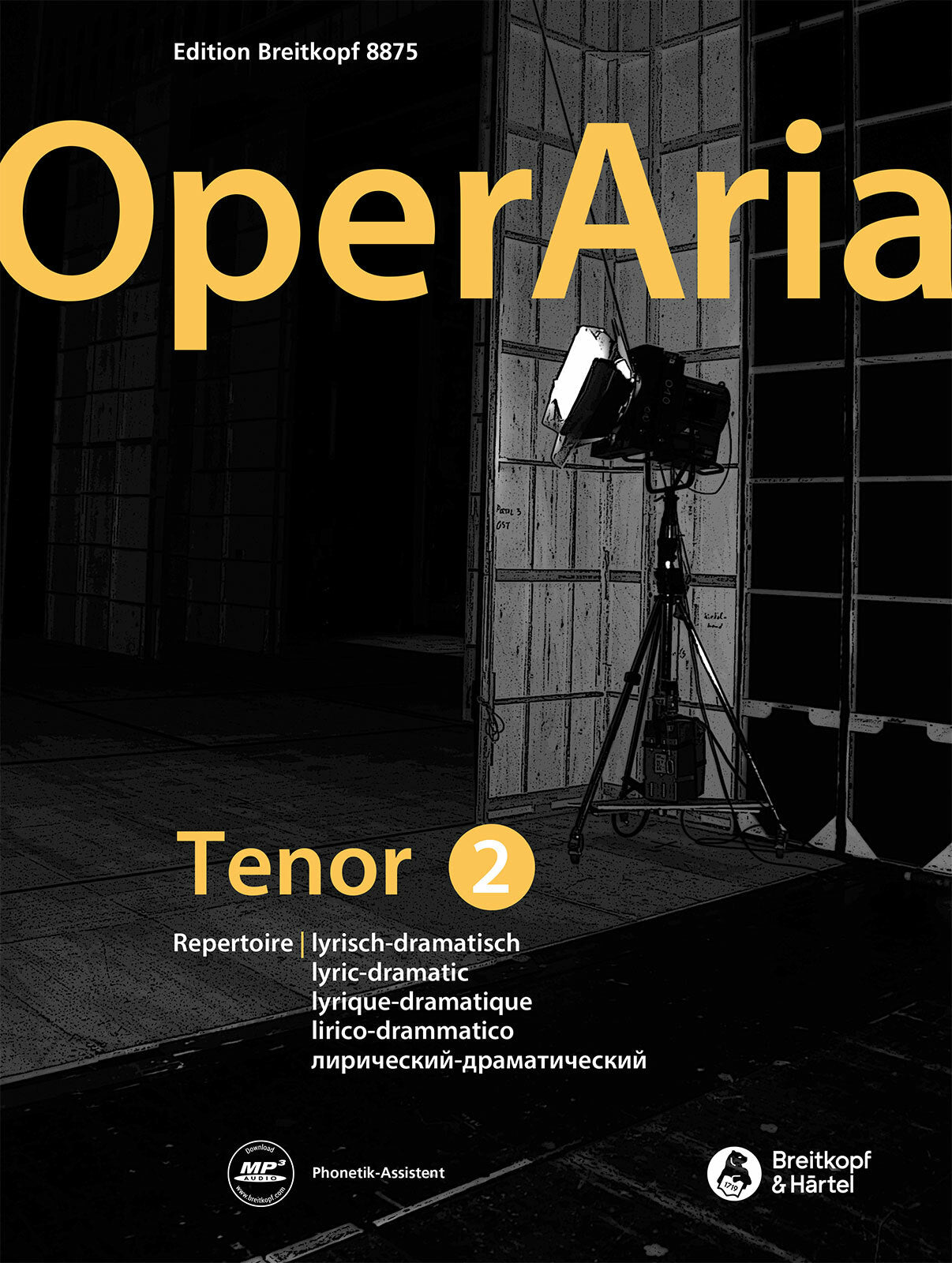OperAria Tenor - Volume 2 - Lyric-Dramatic
In stock and typically ships within 1 business day.
- Composers: Otto Nicolai (1810-1849), Wolfgang Amadeus Mozart (1756-1791), Giuseppe Verdi (1813-1901), Benjamin Godard (1849-1895), Friedrich von Flotow (1812-1883), Pyotr Ilyich Tchaikovsky (1840-1893), Gioachino Rossini (1792-1862), Georges Bizet (1838-1875), Gaetano Donizetti (1797-1848), Charles Gounod (1818-1893), Édouard Lalo (1823-1892), Giacomo Puccini (1858-1924), Antonio Pasculli (1842-1924), Léo Delibes (1836-1891), Carl Maria von Weber (1786-1826), Jules Massenet (1842-1912), Vincenzo Bellini (1801-1835)
- Format: Vocal Score
- Instrumentation (this edition): Piano Reduction, Tenor
- Originally for: Piano, Oboe, Opera
- Work Language: German
- ISMN:
- Size: 9.1 x 12.0 inches
Description
The three volumes for tenor represent the grand finale of the most comprehensive collection of repertoire for all vocal genres, with 16 volumes.
"Our goal is to give the user a modern-day, systematically structured vocal coach who satisfies the demands of present-day theater practice. At long last a consistent repertoire and a well-ordered conflation of respective audition arias for all vocal genres." (Peter Anton Ling, editors)
Works:
- Mozart: Konstanze! Dich wiederzusehen / O wie ängstlich from Don Giovanni, K. 527
- Mozart: Dalla sua pace from Don Giovanni, K. 527
- Mozart: Il mio tesoro intanto from Don Giovanni, K. 527
- Mozart: Un’aura amorosa from Così fan tutte, K. 588
- Mozart: Dies Bildnis ist bezaubernd schön from Die Zauberflöte (The Magic Flute), K. 620
- Weber: Was ich dann tu' from Die drei Pintos (The 3 Pintos), Anh. 5
- Rossini: Languir per una bella from L'Italiana in Algeri
- Rossini: Ecco ridente in cielo from Il barbiere di Siviglia (The Barber of Seville)
- Donizetti: Una furtiva lagrima from L'elisir d'amore, A. 36
- Donizetti: Ah ! mes amis from La Figlia del Regimento
- Donizetti: Povero Ernesto! / Cercherò lontana terra from Don Pasquale, A. 64
- Pasculli: Favorita del Re! / Spirto gentil from Concerto on themes from Donizetti's 'La Favorita'
- Bellini: A te, o cara from I Puritani
- O. Nicolai: Horch, die Lerche singt im Hain from Die lustige Weiber von Windsor (The Merry Wives of Windsor)
- Flotow: Ach! so fromm from Martha (Der Markt Zu Richmond) (1847)
- Verdi: Questa o quella from Rigoletto
- Verdi: La donna è mobile from Rigoletto
- Verdi: Lunge da lei / De’ miei bollenti spiriti from La Traviata
- Verdi: Dal labbro il canto estasïato vola from Falstaff
- Gounod: Quel trouble inconnu / Salut ! demeure chaste et from Faust, CG 4
- Lalo: Puisqu'on ne peut fléchir / Vainement, ma bien aim from Le roi d'Ys
- Delibes: Prendre le dessin / Fantaisie aux divins mensonge from Lakmé
- Bizet: Je crois entendre encore from Les Pêcheurs de perles (The Pearl Fishers)
- Tchaikovsky: Kuda, kuda from Yevgeny Onegin (Eugene Onegin), ČW 5, Op. 24
- Massenet: Instant charmant / En fermant les yeux from Manon
- Godard: Cachés dans cet asil / Oh, ne t’éveille pas from Jocelyn, Op. 100
- Puccini: Addio fiorito asil from Madama Butterfly
Publishers use a lot of words to describe what they sell, and we know it can be confusing. We've tried to be as clear as possible to make sure you get exactly what you are looking for. Below are descriptions of the terms that we use to describe the various formats that music often comes in.
Choral Score
A score for vocalists that only contains the vocal lines. The instrumental parts are not there for reference. Generally, cheaper than a vocal score and requires multiple copies for purchase.
Facsimile
Reproductions of the original hand-written scores from the composer.
Full Score
For ensemble music, this indicates that the edition contains all parts on a single system (there are not separate parts for each player). In larger ensembles, this is for the conductor.
Hardcover
Hardbound. Generally either linen-covered or half-leather.
Orchestral Parts
Similar to a wind set, this is a collection of parts. In the case of strings, the numbers listed are the number of copies included, though generally these are available individually (often with minimum quantities required).
Paperback
When publishers offer multiple bindings (e.g. hardcover) or study scores, this is the "standard" version. If you're planning to play the music, this is probably what you want.
Performance / Playing Score
A score of the music containing all parts on one system, intended for players to share. There are not separate parts for each player.
Set of Parts
For ensemble music, this indicates that there are separate individual parts for each player.
Solo Part with Piano Reduction
For solo pieces with orchestra, this is a version that contains a piano reduction of the orchestra parts. For piano pieces, two copies are typically needed for performance.
Study Score
A small (think choral size) copy of the complete score meant for studying, and not playing. They make great add-ons when learning concertos and small chamber works.
Vocal Score
A score prepared for vocalists that includes the piano/organ part or a reduction of the instrumental parts.
Wind Set
For orchestral music, this is a collection of wind and percussion parts. The specific quantities of each instrument are notated.
With Audio
In addition to the printed music, the edition contains recordings of the pieces. This may be an included CD, or access to files on the internet.
With / Without Fingering (Markings)
Some publishers prepare two copies - a pure Urtext edition that includes no fingering (or bowing) suggestions and a lightly edited version that includes a minimal number of editorial markings.



